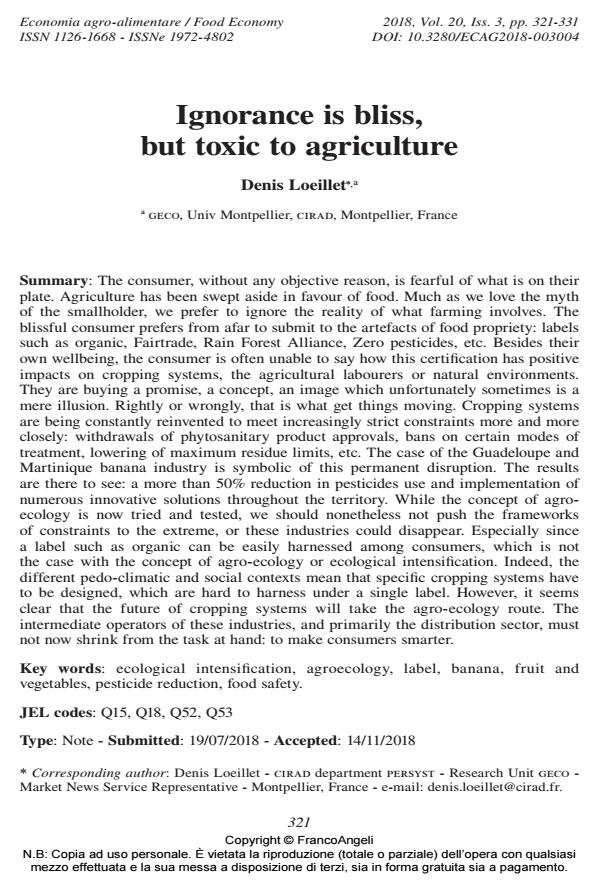Ignorance is bliss, but toxic to agriculture
Titolo Rivista ECONOMIA AGRO-ALIMENTARE
Autori/Curatori Denis Loeillet
Anno di pubblicazione 2019 Fascicolo 2018/3 Lingua Inglese
Numero pagine 11 P. 321-331 Dimensione file 96 KB
DOI 10.3280/ECAG2018-003004
Il DOI è il codice a barre della proprietà intellettuale: per saperne di più
clicca qui
Qui sotto puoi vedere in anteprima la prima pagina di questo articolo.
Se questo articolo ti interessa, lo puoi acquistare (e scaricare in formato pdf) seguendo le facili indicazioni per acquistare il download credit. Acquista Download Credits per scaricare questo Articolo in formato PDF

FrancoAngeli è membro della Publishers International Linking Association, Inc (PILA)associazione indipendente e non profit per facilitare (attraverso i servizi tecnologici implementati da CrossRef.org) l’accesso degli studiosi ai contenuti digitali nelle pubblicazioni professionali e scientifiche
The consumer, without any objective reason, is fearful of what is on their plate. Agriculture has been swept aside in favour of food. Much as we love the myth of the smallholder, we prefer to ignore the reality of what farming involves. The blissful consumer prefers from afar to submit to the artefacts of food propriety: labels such as organic, Fairtrade, Rain Forest Alliance, Zero pesticides, etc. Besides their own wellbeing, the consumer is often unable to say how this certification has positive impacts on cropping systems, the agricultural labourers or natural environments. They are buying a promise, a concept, an image which unfortunately sometimes is a mere illusion. Rightly or wrongly, that is what get things moving. Cropping systems are being constantly reinvented to meet increasingly strict constraints more and more closely: withdrawals of phytosanitary product approvals, bans on certain modes of treatment, lowering of maximum residue limits, etc. The case of the Guadeloupe and Martinique banana industry is symbolic of this permanent disruption. The results are there to see: a more than 50% reduction in pesticides use and implementation of numerous innovative solutions throughout the territory. While the concept of agroecology is now tried and tested, we should nonetheless not push the frameworks of constraints to the extreme, or these industries could disappear. Especially since a label such as organic can be easily harnessed among consumers, which is not the case with the concept of agro-ecology or ecological intensification. Indeed, the different pedo-climatic and social contexts mean that specific cropping systems have to be designed, which are hard to harness under a single label. However, it seems clear that the future of cropping systems will take the agro-ecology route. The intermediate operators of these industries, and primarily the distribution sector, must not now shrink from the task at hand: to make consumers smarter
Keywords:Ecological intensification, agroecology, label, banana, fruit and vegetables, pesticide reduction, food safety.
Jel codes:Q15, Q18, Q52, Q53
- Apfelbaum, M. (1998). Risques et Peurs alimentaires. Paris: Odile Jacob.
- Brad, A., Delemare, A., Hurley, N., Lenikus, V., Mulrenan, R., Nemes, N., Trunk, U., & Urbancic, N. (2018). The false promise of certification. ChangingMarkets Foundation.
- Chabrier, C. (2005). Banane antillaise, les systemes de culture evoluent. Phytoma-La Défense des Végétaux, 584, 12-16.
- cirad (2016). 40 ans d’innovations qui ont révolutionné la culture de la banane. -- Retrieved from: https://antilles-guyane.cirad.fr/content/download/6342/45766/version/2/file/4+pages+Innovation+Banane.pdf.
- Cote, F., & Soussana, J.-F. (2016). Agro-écologie: le positionnement des recherches de l’Inra et du Cirad. -- Retrieved from: www.cirad.fr/content/download/11293/132717/version/3/file/Agro-ecologie-inra-cirad-note-longue.pdf.
- Elay, J., & Agnew, H. (2018). Tesco and Carrefour team up in face of competitive pressures. Financial Time, july 2. -- Retrieved from: www.ft.com/content/27f6c776-7e04-11e8-bc55-50daf11b720d.
- Generations futures (2018). -- Retrievede from: www.generations-futures.fr/actualites/tribune-pesticides-labels-trompeurs.
- Imbert E. et al. (2017). International banana trade – The guide. Fruitrop Focus, (5).
- Larochette, B., & Sanchez-Gonzalez, J. (2015). Cinquante ans de consummation alimentaire: une croissance moderee, mais de profonds changements. Division Syntheses des biens et services. Insee première, (1568).
- Loeillet, D. (2018). Banana: The inflation effect. Degradation of added value. FruiTrop, (254), 76-77.
- Loeillet, D., & Dawson, C. (2017). 3rd World Banana Forum Conference. Essential dialogue. FruiTrop Focus, (253).
- Olivier, V., & Coquart, D. (2018). «Les amap: une alternative socio-economique pour des petits producteurs locaux?». Économie rurale [En ligne], juillet-octobre 2010, 318-319.
- Risede, J.M. (2019). Challenging short and mid-term strategies to reduce the use of pesticides in banana production, Guide number 1, ENDURE.
- Riviere-Weksteing, G. (2017). Panique dans l’assiette – Ils se nourrissent de nos peurs. Paris: Le Publieur.
- Smith, A., & Watkiss, P. (2005). The validity of food miles as an indicator of sustainable development, Rapport defra, London.
- Toillier, A., & de Lapeyre de Bellaire, L. (2017). Developpement durable et filieres tropicales. In Bienabe, E., Rival, A., & Loeillet, D., Sustainable development and tropical agri-chains (pp. 93-124). New York: Springer.
- Guest Editorial Future food availability is not only an agricultural topic, but also a society issue Catherine Macombe, Raymond Auerbach, Andrea Raggi, Roberta Salomone, in ECONOMIA AGRO-ALIMENTARE 3/2019 pp.293
DOI: 10.3280/ECAG2018-003002 - Diversity of food systems for securing future food availability Catherine Macombe, in ECONOMIA AGRO-ALIMENTARE 3/2019 pp.351
DOI: 10.3280/ECAG2018-003006
Denis Loeillet, Ignorance is bliss, but toxic to agriculture in "ECONOMIA AGRO-ALIMENTARE" 3/2018, pp 321-331, DOI: 10.3280/ECAG2018-003004